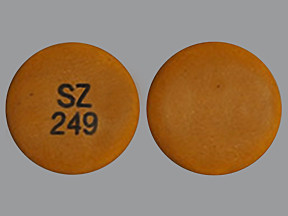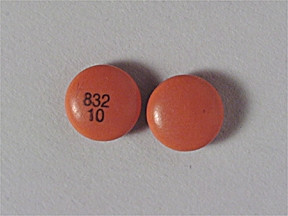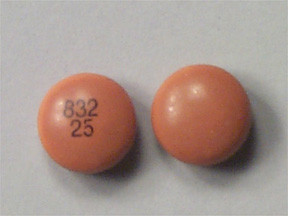CHLORPROMAZINE - ORAL
PHONETIC PRONUNCIATION: (klor-PRO-muh-zeen)
COMMON BRAND NAME(S): Thorazine
GENERIC NAME(S): chlorpromazine HCl
Uses
USES: This medication is used to treat certain mental/mood disorders (such as schizophrenia, psychotic disorders, manic phase of bipolar disorder, severe behavioral problems in children). Chlorpromazine helps you to think more clearly, feel less nervous, and take part in everyday life. It can reduce aggressive behavior and the desire to hurt yourself/others. It may also help to decrease hallucinations (hearing/seeing things that are not there). Chlorpromazine is a psychiatric medication that belongs to the class of drugs called phenothiazine antipsychotics. It works by helping to restore the balance of certain natural substances in the brain. Chlorpromazine is also used to control nausea/vomiting, relieve prolonged hiccups, relieve restlessness/anxiety before surgery, and help treat tetanus.
How to use CHLORPROMAZINE - ORAL
HOW TO USE: Take this medication by mouth with or without food, usually 2-4 times daily or as directed by your doctor. Dosage is based on your medical condition, age, and response to treatment. In children, the dosage is also based on weight. To reduce your risk of side effects, your doctor may direct you to start this medication at a low dose and gradually increase your dose. Follow your doctor's instructions carefully. Take this medication regularly to get the most benefit from it. To help you remember, take it at the same times each day. Although you may notice some medication effects soon after starting, for some conditions, it may take several weeks before you get the full benefit of this drug. Do not stop taking this medication without consulting your doctor. Some conditions may become worse when this drug is suddenly stopped. Also, you may experience symptoms such as upset stomach, nausea, vomiting, dizziness, and shakiness. To prevent these symptoms while you are stopping treatment with this drug, your doctor may reduce your dose gradually. Consult your doctor or pharmacist for more details. Report any new or worsening symptoms right away. Tell your doctor if your condition does not improve or if it worsens.
Side Effects
Precautions
Interactions
Overdose
Images

- color
- butterscotch
- shape
- round
- imprint
- SZ 201

- color
- butterscotch
- shape
- round
- imprint
- SZ 202

- color
- butterscotch
- shape
- round
- imprint
- SZ 203

- color
- butterscotch
- shape
- round
- imprint
- SZ 225

- color
- butterscotch
- shape
- round
- imprint
- SZ 249

- color
- butterscotch
- shape
- round
- imprint
- 832 10

- color
- butterscotch
- shape
- round
- imprint
- 832 25

- color
- butterscotch
- shape
- round
- imprint
- 832 25

- color
- butterscotch
- shape
- round
- imprint
- 832 25
Reviews
Faq for CHLORPROMAZINE - ORAL
Chlorpromazine is an oral medication used to treat various mental and emotional conditions, such as schizophrenia and bipolar disorder. It belongs to a class of drugs called phenothiazines.
Chlorpromazine works by affecting certain chemicals in the brain, including dopamine. It helps to restore the balance of these chemicals, which can reduce symptoms of mental disorders.
Common side effects may include drowsiness, dizziness, blurred vision, dry mouth, constipation, and weight gain. These side effects are usually mild and go away on their own. However, it is important to talk to your doctor if they become severe or persistent.
Yes, in some cases, chlorpromazine may be used to treat nausea and vomiting, particularly in certain types of cancer treatment. However, this is an off-label use and should be done under the guidance of a healthcare professional.
No, chlorpromazine is not considered habit-forming. However, it is important to take the medication exactly as prescribed and not exceed the recommended dosage without consulting your doctor.
It is generally recommended to avoid alcohol while taking chlorpromazine. Alcohol can increase the sedative effects of the medication and may worsen side effects such as drowsiness and dizziness.
The exact time it takes for chlorpromazine to work varies from person to person. Some individuals may start experiencing improvement in symptoms within a few days, while others may need several weeks of consistent treatment before significant benefits are observed.
No, you should not abruptly stop taking chlorpromazine without consulting your doctor. Suddenly discontinuing the medication can lead to withdrawal symptoms or a recurrence of your original condition. Your doctor will guide you on how to safely taper off the medication if needed.
Yes, there are several medications that can interact with chlorpromazine, including certain antidepressants, antihistamines, blood pressure medications, and anticonvulsants. It is important to inform your doctor about all the medications, supplements, and herbal products you are currently taking before starting chlorpromazine.
Warning
WARNING: There may be a slightly increased risk of serious, possibly fatal side effects (such as heart failure, fast/irregular heartbeat, pneumonia) when this medication is used by older adults with dementia. This medication is not approved for the treatment of dementia-related behavior problems. Discuss the risks and benefits of this medication, as well as other effective and possibly safer treatments for dementia-related behavior problems, with the doctor.
Disclaimer
IMPORTANT: HOW TO USE THIS INFORMATION: This is a summary and does NOT have all possible information about this product. This information does not assure that this product is safe, effective, or appropriate for you. This information is not individual medical advice and does not substitute for the advice of your health care professional. Always ask your health care professional for complete information about this product and your specific health needs.
No Reviews Yet